Jože ŠTURM
Anthropological kinesiology-a possible approach in designing sport science
Franc AGREŽ
The influence of directed motor activity on morphologic and motor dimensions of adults
Franc AGREŽ
Correlation between laterality of the extremities and their sequential velocity
Milan ČOH
Latent dimensions of take–off power
Milan ČOH , Milan TERČELJ, Ivan BIZJAK, Peter FAJFAR
Physical parameters of start acceleration
Ivan ČUK, Doljana NOVAK, Toni BOLKOVIĆ, Branka VAJNGERL
A computer supported system of primary selection of children in sports gymnastics
Bojan LESKOŠEK, Marko BOHANEC, Vladimir RAJKOVIČ, Jože ŠTURM
Expert system for evaluating children's sports talents
Jože ŠTURM
Anthropological kinesiology-a possible approach in designing sport science
University of Ljubljana - Faculty of Sport, Gortanova 22, SI-1000 LJUBLJANA, Slovenia
Tel: +386 1 540-10-77
Fax: +386 1 540-22-33
In the article, a plan for anthropological kinesiology as an interdisciplinary (cross – disciplinary) science, striving for an integral treatment of man who, through sports motor activities, partakes of the transformation effects on social and natural – science viewpoints of his nature, is put forward.
Keywords: sport science, anthropology, kinesiology, term definition
Franc AGREŽ
The influence of directed motor activity on morphologic and motor dimensions of adults
University of Ljubljana - Faculty of Sport, Gortanova 22, SI-1000 LJUBLJANA, Slovenia
Tel: +386 1 540-10-77
Fax: +386 1 540-22-33
An analysis was made of the effect of directed motor activity programmes on morphologic characteristics and motor abilities of two groups of female workers, aged 18 – 54 years of age. The experimental programmes lasted 4 months, twice weekly for 60 minutes. The effects of the sport programmes were monitored with 14 anthropometric measures and 10 motor tests.
The results showed:
- a drastic improvement of motor abilities: in different forms of power for 20%, co-ordination of movement for 32%, movement velocity for 23%, general endurance for 12%
- a decrease of body weight for 3% and subcutaneous fat for 13%.
These results represent a powerful argument in favour if implementing direct motor activity in the system of modern production process. Partial analyses of some profiles of employees outside material production (engineers, managers, university teachers etc.) show the need for specific programmes, which is being slowly recognised and implemented. However, in hierarchically lower segments of production, this approach is still undeveloped.
Keywords: morphology, motorics, adult, female, employee, programme, effect
Franc AGREŽ
Correlation between laterality of the extremities and their sequential velocity
University of Ljubljana - Faculty of Sport, Gortanova 22, SI-1000 LJUBLJANA, Slovenia
Tel: +386 1 540-10-77
Fax: +386 1 540-22-33
The research was performed on a sample of 48 male students of the first year at the Faculty of sport in Ljubljana. The information on sequential velocity of the upper and lower extremities was gathered with tests of tapping, information on the dominance of the extremities with standard questionnaires. Testing of differences in sequential velocity between the dominant and none – dominant extremities was performed with the Student t – test for small dependent samples.
The results of the research showed a statistically highly significant difference in the manifestation of sequential velocity, favouring the dominant extremity.
Keywords: limb, sequential velocity, side dominance, difference, males
Milan ČOH
Latent dimensions of take–off power
University of Ljubljana - Faculty of Sport, Gortanova 22, SI-1000 LJUBLJANA, Slovenia
Tel: +386 1 540-10-77
Fax: +386 1 540-22-33
E-mail: milan.coh@sp.uni.lj.si
The purpose of this study was to establish the reliability of measurement procedures and latent structure of take – off power. A sample of 124 top athletes from six different sports in the Republic of Slovenia was measured with 7 tests of take–off power and 14 tests of morphologic characteristics. The results were processed with the statistical packages SPSS and GENSTAT.
A higher level of reliability was obtained for all the tests of take–off power. The latent structure is defined by three dimensions: factor of elastic power, factor of short sprint and factor of explosive power.
Keywords: take-off power, measurement, reliability, structure, top athletes
Bojan JOŠT
Some model characteristics of ski jumpers found with the standard procedure and with a method of expert modelling
University of Ljubljana - Faculty of Sport, Gortanova 22, SI-1000 LJUBLJANA, Slovenia Tel: +386 1 520 77 00 Fax: +386 1 520 77 40
On a sample of 26 ski jumpers we studied their model characteristics in the morphologic and motor space. The structure of take-off power of a ski jumper in laboratory conditions was also studied. For this purpose a special training apparatus »Planica 2« was constructed on which the relevant take-off parameters were measured. The results of this research project are shown in detail in the research report published by the Institute of Kinesiology.
Keywords: ski jump, expert modell
Tomislav KOPRIVNJAK
On a sample of 325 primary school pupils of the 7th and 8th grade taken from the population of primary schools in the Republic of Slovenia an analysis was made, of the relations between latent dimensions of the social status of parents with the attitudes of their children to physical education and sport.
For this purpose the following multivariate analysis has been used: canonical correlation analysis, taxonomic analysis and canonical discriminant analysis. Hypothetically we can probably say that the expected general correlation between the two subspaces is diminished by factors such as: not all indicators were measured that would enable us to better differentiate subjects, social status inconsistency, primary socialisation is completed and also, the education process diminishes differences between subjects of opposite poles of the social status scale.
Milan ČOH , Milan TERČELJ, Ivan BIZJAK, Peter FAJFAR
Physical parameters of start acceleration
Milan ČOH, University of Ljubljana - Faculty of Sport, Gortanova 22, SI-1000 LJUBLJANA, Slovenia
Tel: +386 1 540-10-77
Fax: +386 1 540-22-33
E-mail: milan.coh@sp.uni.lj.si;
Milan TERČELJ, Ivan BIZJAK, Peter FAJFAR - University of Ljubljana, Faculty of Natural Sciences and Technology
Milan TERČELJ**, Ivan BIZJAK**, Peter FAJFAR**
The purpose of the study was to find some objective parameters of start acceleration, which is one of the most important sprinting abilities. Acceleration is not important just in sprint, but also in many other sports, where one has to overcome a certain distance in the least possible time. A new measurement technology was used, bringing innovation to our sport praxis.
Differences in the efficiency of the start action appear because of different motor reaction times, the relative force of the pressure on the starting block and only to a smaller extent because of the latent reaction times.
The start acceleration is quite independent of the start action parameters. Its efficacy is mainly influenced by the velocity attainment between the 5m and 15m mark.
Keywords: track and field, sprint, start acceleration, parameters, measurement
Ivan ČUK, Doljana NOVAK, Toni BOLKOVIĆ, Branka VAJNGERL
A computer supported system of primary selection of children in sports gymnastics
University of Ljubljana - Faculty of Sport, Gortanova 22, SI-1000 LJUBLJANA, Slovenia Tel: +386 1 520 77 00 Fax: +386 1 520 77 40
The article presents five years experience using computer-aided selection of gifted children for male and female artistic gimnastics and rhytmic gimnastics. The aims, purpose and methods are defined and results of selection shown.
Keywords: computer, gymnastics, selection
Bojan LESKOŠEK, Marko BOHANEC, Vladimir RAJKOVIČ, Jože ŠTURM
Expert system for evaluating children's sports talents
The article presents a computer backed expert system for evaluating talent in sports. The s) ~tem was developed in collaboration of the Faculty of Sports in Ljubljana and the »Josef Stefan« Institute. It has been used practically for evaluating talent of more than 10.000 children in Slovenia, for over 13 different sports, over a period of several years. Special attention was paid to the most delicate work - development of the expert system, the so called construction of the model, or knowledge base. In this work a number of experts of various professions participated. Methods for verifying accuracy of the aquired knowledge, the procedure, and an example of the use of the expert system, as well as the benefits the PC (personal computer) with programs DEX and D has to offer, are also presented.
Bojan JOŠT, Vojko STROJNIK
Top competitive sport demands simultaneous veri¬fication of some indicators of successfulness of the competitors, to which vertical jump velocity surely belongs. This psycho-motor parameter can be mea¬sured in two ways. Firstly, using a tensiometric force¬plate, which requires expensive technology and labo¬ratory conditions; while the second, on a special mea¬surement kinematic plank, needs only a simple po¬rtable apparatus, usable also in the field. The purpose of this study is to find the compatibility of the gathe¬red data on both measurement instruments, reliabi¬lity of the variables, structure of variables of vertical velocity and their cross-validity.


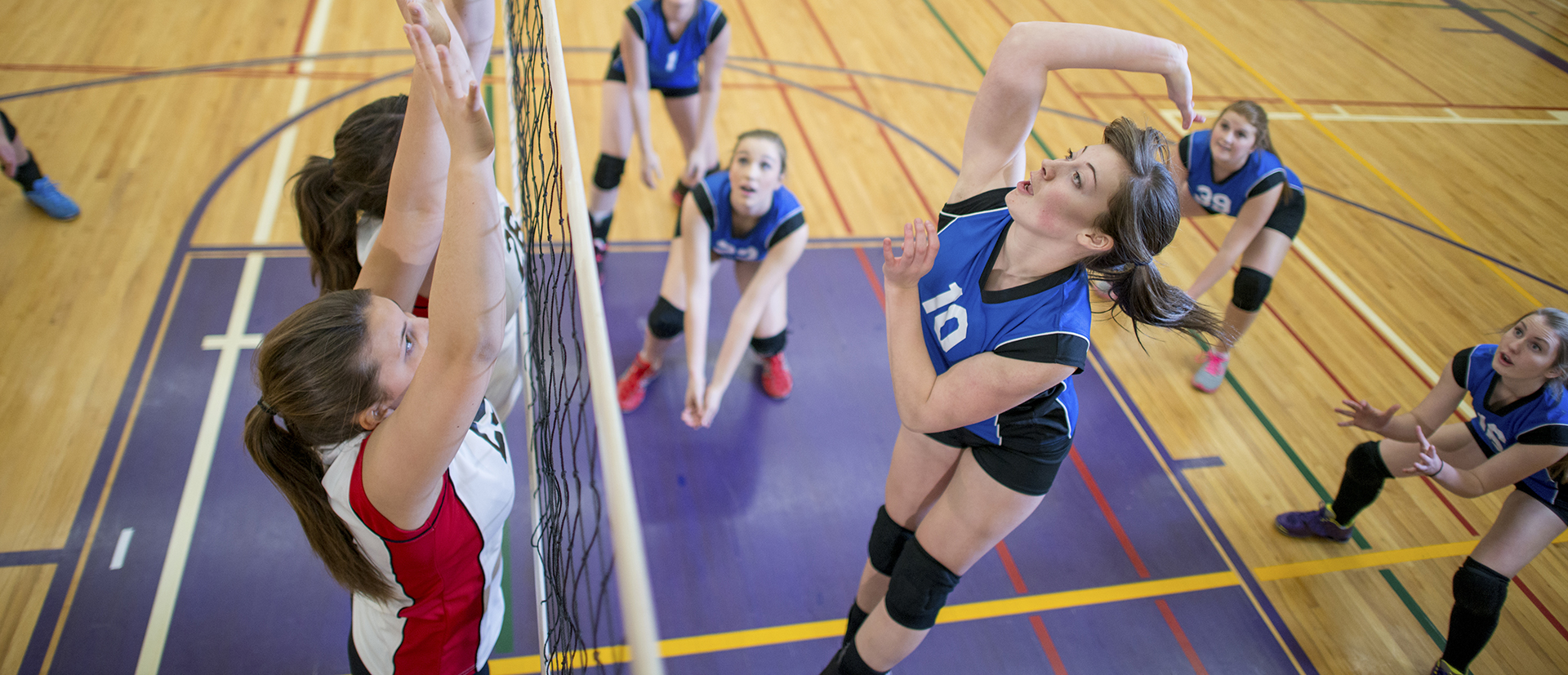



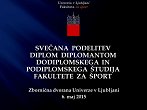






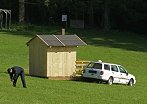






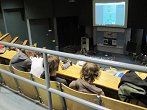

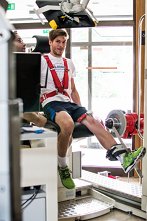
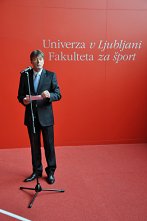
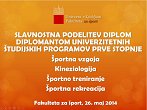





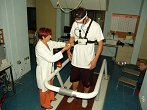




.png)